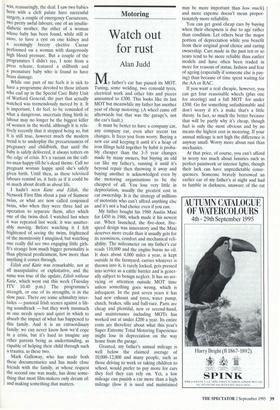Motoring
Watch out for rust
Alan Judd
My father's car has passed its MOT. Tuning, some welding, two remould tyres, electrical work and other bits and pieces amounted to £300. This looks like its last MOT but meanwhile my father has another year of cheap motoring. (A wheel came off afterwards but that was the garage's, not the car's fault.) It must be better to have a company car, any company car, even after recent tax changes. It frees you from worry. Buying a new car and keeping it until it's a heap of iron filings held together by habit is proba- bly cheaper than the 3-5 year changes made by many owners, but buying an old car like my father's, running it until it's beyond repair then throwing it away and buying another is acknowledged even by the motoring organisations to be the cheapest of all. You lose very little in depreciation, usually the greatest cost in car ownership. It is the strategy of millions of motorists who can't afford anything else and it's not a bad choice even if you can.
My father bought his 1980 Austin Maxi for £450 in 1988, which made it his newest car. When launched, the five-door, five- speed design was innovatory and the Maxi deserves more credit than it usually gets for its roominess, comfort and mechanical reli- ability. The mileometer on my father's car reads 110,000 and the engine burns no oil. It does about 4,000 miles a year, is kept outside in the farmyard, carries whatever is thrown into it, is rarely locked, gets pressed into service as a cattle barrier and is gener- ally subject to benign neglect. It has no ser- vicing or attention outside MOT time unless something goes wrong, which is infrequent. In the past seven years it has had new exhaust and tyres, water pump, clutch, brakes, sills and ball-race. Parts are cheap and plentiful, new or second-hand, and maintenance including MOTs has worked out at under £200 a year. Its entire costs are therefore about what this year's Super Extreme Total Motoring Experience might lose in depreciation on the way home from the garage.
Granted, my father's annual mileage is well below the claimed average of 10,000-12,000 and many people, such as those driving to work or taking children to school, would prefer to pay more for cars they feel they can rely on. Yet, a low mileage can punish a car more than a high mileage (how it is used and maintained may be more important than how much) and more expense doesn't mean propor- tionately more reliability.
You can get good cheap cars by buying when their cheapness is due to age rather than condition. Let others bear the major portion of depreciation while you benefit from their original good choice and caring ownership. Cars made in the past ten or so years tend to be more reliable than earlier models and have often been traded in more for reasons of status, fashion and fear of ageing (especially if someone else is pay- ing) than because of time spent waiting for the AA or RAC.
If you want a real cheapie, however, you can get four reasonable wheels (plus one for steering) and a full MOT for under £500. Go for something unfashionable and don't worry if it's a make that's a little thirsty. In fact, so much the better because that will be partly why it's cheap, though fuel is only the most obvious and by no means the highest cost in motoring. If your annual mileage is not high the difference is anyway small. Worry more about rust than mechanics.
At that price, of course, you can't afford to worry too much about luxuries such as perfect paintwork or interior lights, though their lack can have unpredictable conse- quences. Someone bravely borrowed an earlier car of my father's at night and had to fumble in darkness, unaware of the rat by the clutch until it ran up his leg, across his belly and chest and onto his shoulder before leaping out of the window. But that, again, was not the car's fault.
PS. Car seats for back sufferers: Sheila Lowson of Leicestershire recommends the new Vauxhall Astra. The League of Back Sufferers is grateful for any further recommendation.



















































 Previous page
Previous page